50 YEARS OF ANCSACelebrating 50 Years of a Mission Beyond Business
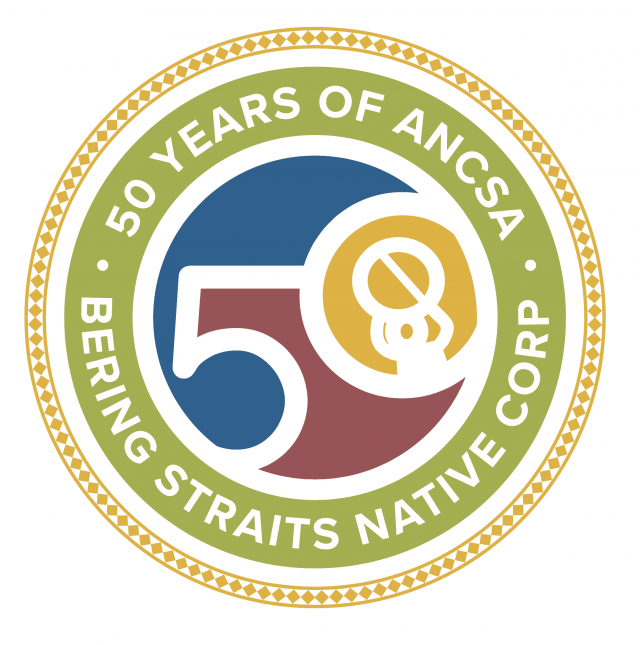 Bering Straits Native Corporation (BSNC) was formally recognized by the State of Alaska as a state-incorporated entity on June 23, 1972. We are pleased to celebrate 50 years of improving the quality of life of Our People through economic development while protecting our land and preserving our culture and heritage.
Bering Straits Native Corporation (BSNC) was formally recognized by the State of Alaska as a state-incorporated entity on June 23, 1972. We are pleased to celebrate 50 years of improving the quality of life of Our People through economic development while protecting our land and preserving our culture and heritage.
Shortly after ANCSA was made law, five incorporators within each region signed Articles of Incorporation to conduct business for profit. BSNC’s original articles of incorporation were signed by Jerome Trigg, Martin Olson, Fred Katchatag, Sr., Charles W. Fagerstrom and George Bell.
BSNC is owned by and exists for the benefit of our shareholders and descendants. BSNC began with 6,333 original shareholders and today there are more than 8,100 shareholders through the process of gifting and inheritance of stock. BSNC is a mission-driven company working to both foster a continuation of our way of life, and build value for Our People through economic development.

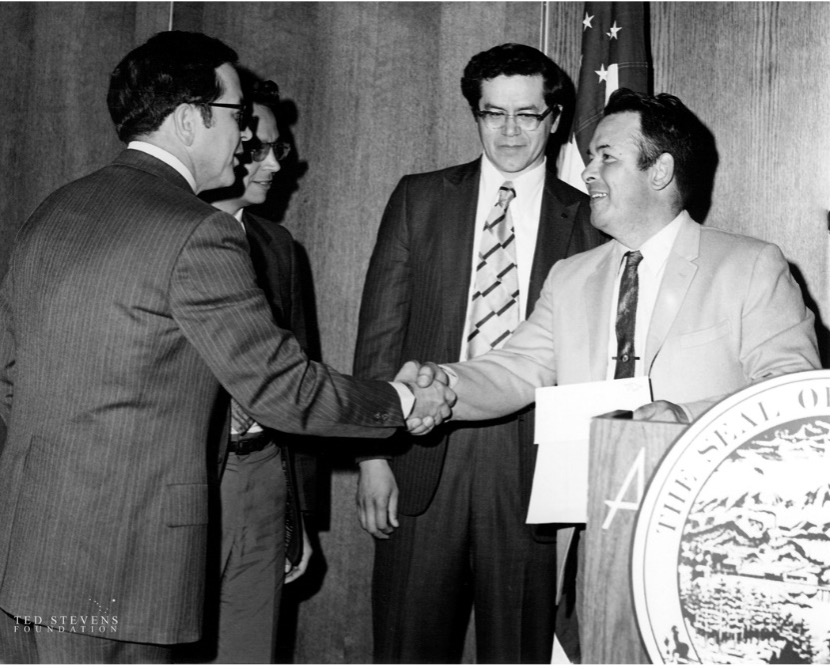
Senator Ted Stevens, left, congratulates Martin Olson, right, and Gary Longly, center right, of Bering Straits Corporation, in Anchorage on July 1, 1972, after the implementation of ANCSA and the distribution of the first settlement checks to Native Corporations. (Dept. of Interior/Stevens Foundation photo)
ANCSA is Passed
After intense internal negotiations among the various Alaska Native groups and between Alaska Federation of Natives (AFN) delegates and the state and federal government, Congress finally passed Alaska Native land claims legislation in 1971. On Dec. 18, 1971, President Richard Nixon addressed the delegates of AFN by phone and informed them that he had just signed the Alaska Native Claims Settlement Act into law.
At the time, ANCSA constituted the largest land claims settlement in U.S. history, and evidenced a change in federal Indian policy by the U.S. government. ANCSA extinguished aboriginal land claims in Alaska and mandated a for-profit model with land title under corporate ownership. Alaska Native Corporations (ANCs) were the first socially responsible for-profit entities tasked with promoting the social, cultural and economic advancement of Alaska Native people and communities in perpetuity.
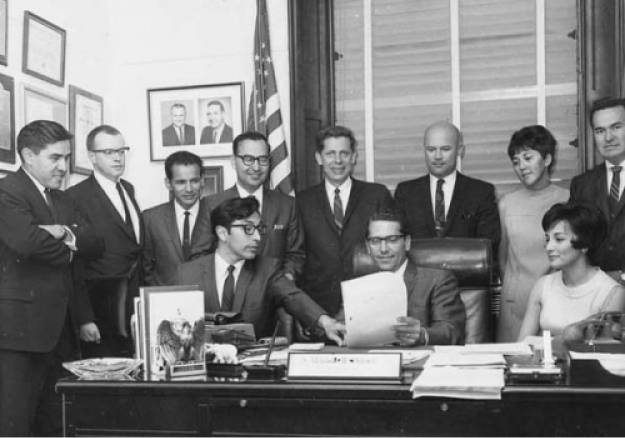
Washington D.C. (Standing left to right): Albert Kaloa, Jr. (Tyonek), Stanley J. McCutcheon (Tyonek Lawyer), Emil Notti (Ruby), Flore Lekonof (St. George), Cliff Groh, Sr., Barry Jackson (Fairbanks), Margaret Nick, and Morris Thompson (Tanana). Seated left: Willie Hensley. Seated right: Laura Bergt.
Upon the passage of ANCSA, a new era began for Alaska Native people. The federal government transferred 44 million acres of surface and subsurface land to Alaska Native regional and village corporations and distributed $962.5 million to the corporations as part of the settlement of aboriginal land rights. Approximately 80,000 Alaska Native people enrolled as ANCSA shareholders. Many of the early ANC leaders did not have educational opportunities past high school, and had limited experience in corporate management.
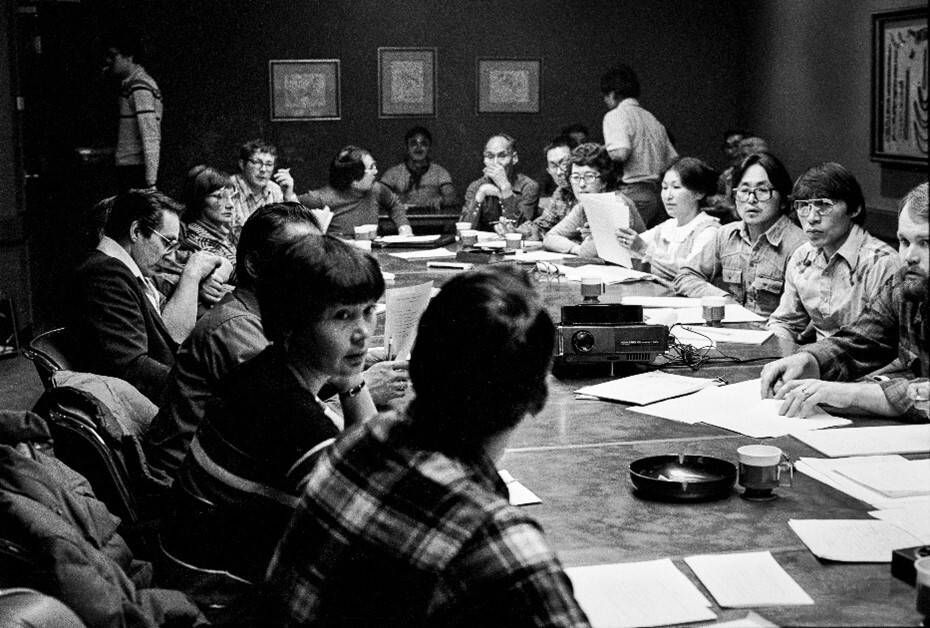
The first BSNC Board of Directors faced the task of identifying lands. Some of the Directors pictured are Richard Atuk, George Walters, Martin Olson, Bill Barr, Fran Degnan, Vern Olson and Suzanne Wassman during a land selections meeting in 1973 or 1974. (Photo by Bartz Englishoe)
1991 Amendments
When ANCSA passed in 1971, the land and ANCSA stock was protected from sale or loss. But after 20 years, there was a window for such sales to occur, allowing shareholders to sell their stock. Under this scenario, the stock could then go public, meaning that anybody could own it, not just Alaska Natives. And the new stock owner could then own a share in the lands that were conveyed under ANCSA and other benefits from the Native corporation.Amendment: This amendment put significant restrictions on the ability of ANCSA stock to go public and the ability for shareholders to sell their stock. Under the amendment, shareholders can vote to “go public” but this would require a supermajority of eligible shares to vote to approve.
Under ANCSA, each regional corporation was authorized to issue shares of stock to Alaska Natives enrolled with that region. These shareholders are considered “original” shareholders. Under the New Stock Issuance amendment to ANCSA, corporations were allowed to ask shareholders if new shares should be added.Amendment: Under this amendment, shareholders of each corporation may vote to issue up to 100 shares of additional Alaska Native stock to descendants (those born after December 18, 1971), Elders (over 65 years of age), and Natives who, for whatever reason, missed the original enrollment.
Other ANCSA Amendments
Amendments to the historic legislation are allowing corporations and leaders to leverage the value and benefits of ANCSA. In 1987, corporations had the ability to establish settlement trusts to issue payments or other benefits to shareholders with no tax liability. This was a significant amendment that allowed BSNC to create the Beringia Settlement Trust which has tax benefits to both the company and our shareholders.
The Alaska Native Vietnam Era Veterans Land Allotment Program provides for any Alaska Native Vietnam veteran who served between Aug. 5, 1964, and Dec. 31, 1971, to select up to 160 acres of federal land that they may have been eligible for under the Alaska Native Allotment Act, but were not able to apply for due to service in Vietnam. The Alaska Native Allotment Act was repealed when ANCSA was enacted in 1971.Amendment: In 2019, ANCSA was amended and reopened the application period for eligible Alaska Native Vietnam veterans or their heirs. Applications are being accepted through Dec. 29, 2025.
On July 30, 2020, an historic milestone was reached when the Bureau of Land Management (BLM) signed a final patent transferring more than 2,000 acres of ANCSA land at Point Spencer, adjacent to Port Clarence. The lands and adjacent waters of Port Clarence have served as a port of refuge for people of the Bering Strait region for centuries and the site holds important strategic geopolitical as well as historic ancestral and cultural significance.
“This conveyance has special meaning to me, as it represents partial fulfillment of lands selected by BSNC’s original Board of Directors, realizing the promise of the Alaska Native Claims Settlement Act nearly 50 years ago,” said BSNC President & CEO Gail R. Schubert.
The lands at Point Spencer are of national interest for the Coast Guard to more permanently conduct its duties in the Arctic. The conveyance allows for public and private sector facility and infrastructure development that will benefit the United States. The lands being conveyed to BSNC contain an 8,000-foot airstrip that was constructed by the Coast Guard, and additional lands will be transferred to BSNC at a future date, once environmental mitigation has been completed.

Our mission is to improve the quality of life of Our People through economic development while protecting our land and preserving our culture and heritage.
ANCs are unique in that our missions include a strong social component. BSNC is a mission-driven company working to both foster a continuation of our way of life, and building value for Our People through economic development.
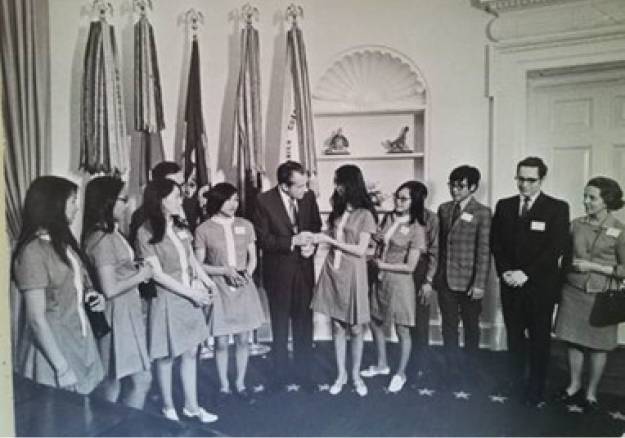
Unalakleet high school students meet President Nixon in the Oval Office. To the immediate right of President Nixon is the late BSNC Board Director Martha Aarons. To the immediate left of President Nixon is the late Hazel Sagoonick.
Our subsistence way of life is always considered when the Board of Directors and management meet and plan growth strategies. Because of this, we have thrived as Arctic people for thousands of years, sustaining rich cultural and social values that we share with future generations. We rely on the land, respect our heritage, and work to ensure that our descendants have the same opportunities to live healthy and sustainable lives. We strongly believe that sustainably in the Arctic should guide our future governance of our homelands.
We are living through a period of extraordinary uncertainty. With employees working on projects across the U.S. and globe, both the moving parts and the entirety of the work of our employees can go largely unseen, but each employee plays an important role in helping BSNC fulfill its mission.
After 50 years, despite the humble beginnings, Alaska Native regional corporations have become an integral part of the Alaska economy. Today, Alaska Native people, Our People, participate in Alaska’s and our Nation’s economic, political and social development, and continue to be the best stewards of our lands.
Looking Forward to a Bright Arctic Future
Since the passage of ANCSA, we are pleased to note that to date BSNC has distributed more than $57 million in benefits to our shareholders and descendants. In fiscal year 2021, BSNC’s operating revenues totaled more than $468 million, our highest revenues to date. Management and the Board have worked hard to build a company that can provide sustainable benefits and services to our shareholders. We are committed to growing our family of companies and providing the best value possible to you, our shareholders. Quyana for your continued support.
BSNC’s endurance and growth over the past ten years is a testament to the Company’s commitment to its shareholders and the region. The Board of Directors’ and employees’ commitment to our mission situates the Company to make a positive, long-lasting impact for our shareholders and region.
Today, our company culture is unstoppable in its determination to fulfill its mission. Looking forward, BSNC will continue to work toward increasing shareholder benefits. We are looking forward to a Bright Arctic Future.
Learn More about ANCSA:
- BSNC Land Series: Learn more about ANCSA, BSNC’s land base and how the corporation manages this important asset.
- Read BSNC Director and original incorporation Charles “Chuck” Fagerstrom’s thoughts surrounding ANCSA at the time of passage here: https://beringstraits.com/bsnc-original-incorporator-reflects-on-ancsa.
- ANCSA Resource Center: The ANCSA Resource Center compiles, organizes & presents source documents, commentary and other information relating to ANCSA. It aims to be the broadest and most comprehensive source of information relating to ANCSA and is sponsored by Landye Bennett Blumstein LLP.
- ANCSA Regional Association: The official Association of Alaska Native Regional Corporation CEOs.
- Alaska Native Village Corporation Association: The official association of Alaska Native Village Corporations.
- University of Alaska Fairbanks Alaska Native Knowledge Network: This resource contains links to information, articles, audio interviews and curricula related to ANCSA.
- ANCSA Documentary: “ANCSA: Our People. Our Land. Our Future.” is a documentary produced by the Alaska Native Claims Settlement Act (ANCSA) Regional Association. “ANCSA: Our People. Our Land. Our Future.” looks back at the start of ANCSA using historical footage and photos and captures a glimpse of what’s to come through interviews with Alaska Native leaders, policymakers and culture bearers. The film will premiere on Sunday, Dec. 19 at 7:30 p.m. on KTVF in Fairbanks and 8 p.m. on KTUU in Anchorage and KATH in Juneau and statewide. Visit https://ancsaregional.com/ancsaat50film/ for more information.
- ANCSA and the Agents of Change: The Ted Stevens Foundation’s oral history project features a distinguished group of Alaskans who were instrumental in the passage of the ANCSA. Jake Adams, Cynthia Ahwinona, Nelson Angapak, Roy Ewan, Willie Hensley, Al Ketzler Sr., Sam Kito, Jr., Oliver Leavitt, Lt. Gov. Byron Mallot, Marie Nash, Emil Notti, John Shively, and moderator Kristina Woolston are included in the video.
50 Years of Resilience and Growth
Your Corporation’s management and Board have worked hard to build a Company that can provide sustainable benefits and services to its shareholders. Looking forward, BSNC will continue to work toward increasing shareholder benefits. BSNC is proud to have accomplished the milestone of $500 million in annual revenue at 50 years.
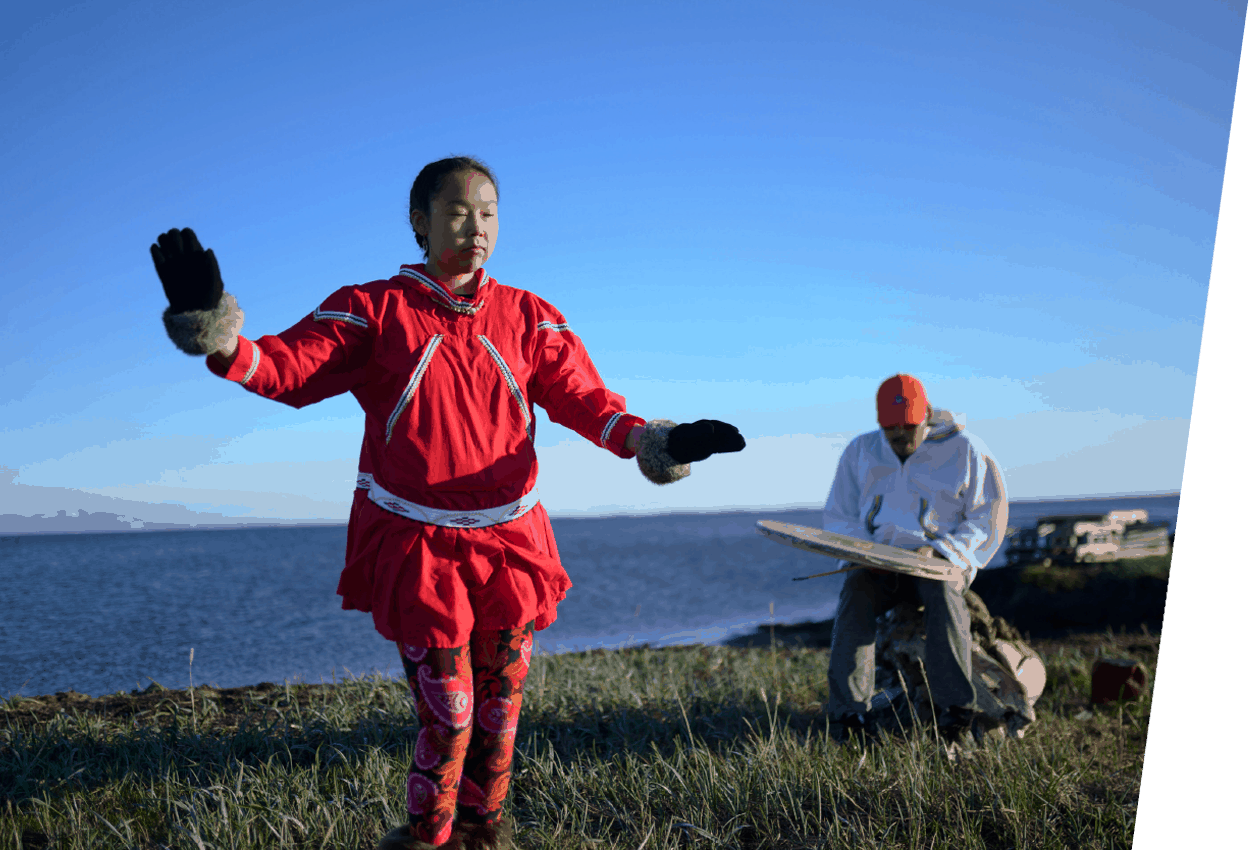
Shareholder
Strong
MyBSNC
Enter your world of Shareholder resources and information. MyBSNC Portal will give you access to your records.
Safety for Our People
Across the BSNC family of companies, nothing is more important than the safety and well-being of our people.
